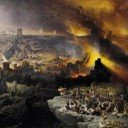As we continue our introductory discussion on the book of Revelation we will now turn our attention to a discussion of the authorship of Revelation. Though there is little doubt as to the authorship with conservative evangelical camps, there are some liberal and secular historians that do not accept the traditional authorship view.
JOHN THE APOSTLE
There is little disagreement about the authorship of the Revelation as it relates to conservative evangelical scholarship. The Apostle John, who also authored the Gospel of John and the Three Epistle’s the bears his name, is considered the author with very little doubt for several reasons.
- The book circulated throughout the Church while the Apostle was still alive and there is no record of his denying the authorship
- The book received vast circulation at a time when those familiar with John would have known his history of being exiled at the time of the vision
- The book bears his name at a time when he was alive and an imposter would not have been able to get away with using the name of someone alive at the time
- The themes are very similar to his other writings - resurrection, logos, lamb, Satan cast down, etc
- The author simply refers to himself as John - an imposter would usually inflate the importance by stating something similar to “Apostle John”
There have been arguments made, though, that believe the book was written some time in the second century by someone known as John The Presbyter. There is little evidence that there was someone named John the Presbyter and it is quite possible that the Apostle John was known as John the Presbyter since the term simply meant overseer and he more than qualified for that position.
The other main argument against John’s authorship is that the Greek is much more inferior than the Greek employed in the writing of John’s epistles and the Gospel of John. This, though, can be simply accounted for by the fact that John was “unschooled” as Acts 4:13 points out and that he more than likely had scribes write the epistles and Gospel. He would not have the same access to a scribe while being exiled on Patmos and more than likely was forced to pen the Revelation himself, leading to the inferior quality Greek.
Also, and this is very important, the “images” he saw may have proved to be quite difficult to translate into Greek. By that I mean that what he saw and wrote had quite a strong Jewish and Hebraic influence upon them - especially the Old Testament allusions - and he possibly found it difficult to find Greek words to match the visions he saw. We will discover just how often he had to use Jewish terms and try and find Greek similarities and struggled to do so and on several occasions listed the Greek and Hebrew word for the same vision (ie. Satan, the Devil)
So, for the purposes of this blog, which is not to convince the “uniniated” or unbeliever, but to share a different way of approaching eschatological ideas and texts, it should be enough to state the majority of commentators, Christian historians and theologians agree that John, the Apostle, is undoubtedly the author of the Revelation.





No comments:
Post a Comment